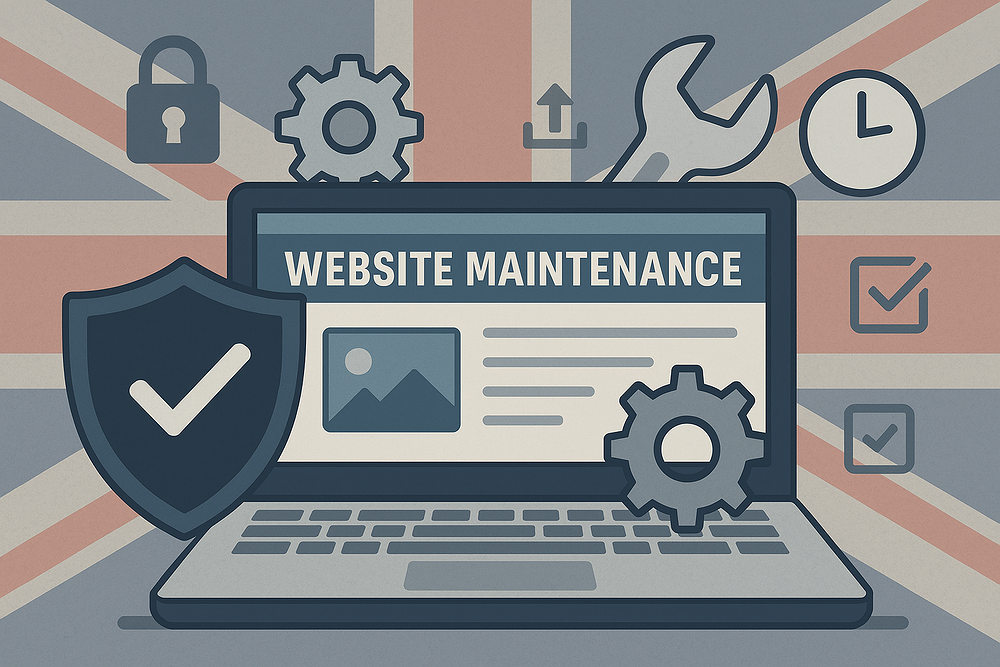Website Maintenance 101: Essential Tasks to Keep Your UK Business Site Secure and Performing

In today's digital-first economy, your website isn't just a virtual business card—it's the heart of your online presence and often the first point of contact with potential customers. Yet many UK businesses invest significantly in creating a beautiful website only to neglect its ongoing maintenance, much like purchasing a new car and never servicing it.
At AppCoder, we've seen firsthand how proper website maintenance not only extends the life of your digital investment but also strengthens your security, improves user experience, and ultimately drives better business results. Here's your essential guide to keeping your business website in peak condition.
Why Website Maintenance Matters for UK Businesses
Before diving into the 'how', let's briefly address the 'why'. Regular website maintenance is crucial because:
- Security vulnerabilities emerge constantly: Cyber threats evolve rapidly, with UK businesses of all sizes increasingly targeted.
- Technology changes at breakneck speed: Browsers, devices, and coding standards update regularly.
- User expectations continue to rise: Today's visitors expect fast-loading, seamless experiences.
- Search engines prioritise healthy sites: Google and other search engines reward well-maintained websites with better rankings.
The cost of neglect? Potential data breaches, lost customers, damaged reputation, and even legal issues under regulations like GDPR. Now, let's look at the essential maintenance tasks every UK business should implement.
Essential Maintenance Tasks for Your Business Website
1. Regular Backups: Your Digital Safety Net
Think of backups as your website's insurance policy. If something goes wrong—whether it's a cyberattack, technical glitch, or human error—backups ensure you can restore your site quickly with minimal data loss.
Best practices include:
- Create automated backups on a regular schedule (daily for active sites, weekly for less active ones)
- Store backups in multiple locations, including off-site
- Test your backup restoration process periodically to ensure it works when needed
- Keep multiple versions of backups (not just the most recent)
Many hosting providers offer backup services, but don't rely solely on these—implement your own backup solution for added security.
2. Software and Security Updates: Your First Line of Defence
Software updates aren't just about new features—they're often critical security patches that protect your website from known vulnerabilities.
Regular update checklist:
- Content Management System (CMS) core updates (WordPress, Drupal, etc.)
- Themes and templates
- Plugins and extensions
- Server software
- SSL certificates (ensure they're not expired)
For UK businesses, prompt updates are particularly important given the increase in targeted attacks against British companies. Set aside a regular maintenance window—perhaps monthly—to review and apply all necessary updates.
3. Security Monitoring and Scanning: Stay Vigilant
Proactive security monitoring helps identify potential threats before they become critical problems.
Key security measures include:
- Regular malware scans
- File integrity monitoring to detect unauthorised changes
- Security audits to identify vulnerabilities
- Implementing strong password policies and two-factor authentication
- Web application firewall (WAF) to filter out malicious traffic
Consider tools like Sucuri, Wordfence, or SiteLock that can automate many of these monitoring tasks for you.
4. Performance Optimisation: Keep Your Site Running Smoothly
A slow website frustrates visitors and damages your search engine rankings. Regular performance checks help ensure your site continues to deliver a fast, smooth experience.
Performance maintenance includes:
- Image optimisation to reduce file sizes without sacrificing quality
- Database cleaning to remove old revisions, spam comments, and unnecessary data
- Caching implementation and configuration
- Code minification (removing unnecessary characters from your code)
- Content Delivery Network (CDN) management
Use tools like Google PageSpeed Insights, GTmetrix, or Pingdom to benchmark your site's performance regularly and identify improvement opportunities.
5. Content Reviews and Updates: Keep Information Fresh
Outdated content doesn't just look unprofessional—it can actively harm your business when customers find incorrect information.
Content maintenance should include:
- Checking for and fixing broken links
- Updating company information, especially contact details and opening hours
- Refreshing outdated statistics, product information, or service descriptions
- Reviewing and updating legal pages (privacy policy, terms of service)
- Optimising underperforming content based on analytics data
Make it a habit to audit content quarterly, with a more comprehensive review annually.
6. Analytics Review: Measure What Matters
Website analytics provide invaluable insights into how visitors interact with your site and where improvements are needed.
Analytics maintenance involves:
- Ensuring tracking codes are properly implemented and working
- Reviewing key metrics like bounce rates, conversion rates, and traffic sources
- Identifying and fixing problematic pages (high bounce rate, low conversion)
- Setting up alerts for unusual patterns that might indicate problems
- Checking that your analytics implementation complies with UK privacy laws
Tools like Google Analytics and Microsoft Clarity offer powerful insights, while privacy-focused alternatives like Fathom or Plausible are gaining popularity among privacy-conscious UK businesses.
Creating Your Website Maintenance Schedule
The complexity of your maintenance schedule will depend on your business size, website complexity, and available resources. Here's a sample maintenance calendar that works for many small to medium UK businesses:
Daily:
- Automatic backups
- Security monitoring alerts
Weekly:
- Check for and apply critical security updates
- Review form submissions and comments for spam
- Quick scan of key pages to ensure they're working properly
Monthly:
- Apply all CMS, plugin, and theme updates
- Perform malware scans
- Review website speed and performance
- Check for broken links
Quarterly:
- Comprehensive content review
- Database optimisation
- In-depth analytics review
- User experience testing
Annually:
- Full security audit
- Comprehensive technical audit
- Review and update of all legal pages
- Evaluation of design and functionality against current trends
When to Consider Professional Help
While some maintenance tasks can be handled in-house, others require technical expertise. Consider working with a professional web maintenance service when:
- You lack the technical skills or time to properly maintain your website
- Your website is critical to your business operations
- You're in a heavily regulated industry with specific compliance requirements
- Your site has complex functionality or integrations
- You've experienced security issues in the past
Professional maintenance services typically cost between £50-200 per month for small to medium websites, but this investment often pays for itself through improved performance, security, and peace of mind.
Conclusion: Maintenance Is an Investment, Not an Expense
Regular website maintenance isn't just about preventing problems—it's about protecting and enhancing one of your most valuable business assets. By implementing these essential maintenance practices, you ensure your website continues to serve as an effective, secure, and high-performing business tool.
At AppCoder, we help UK businesses develop maintenance strategies tailored to their specific needs and technical capabilities. Whether you're looking to handle maintenance in-house or seeking professional support, the most important thing is to start with a clear plan.
Remember: in the digital world, prevention is always more cost-effective than cure. A small, regular investment in website maintenance can save you from the significant costs and headaches of major website problems down the road.
Need help developing a maintenance strategy for your business website? Contact our team at AppCoder for a free consultation on how we can help keep your site secure, fast, and effective.
Talk to us about your next project
Our team of experts is ready to help bring your ideas to life with solutions tailored to your business.
Get in Touch

